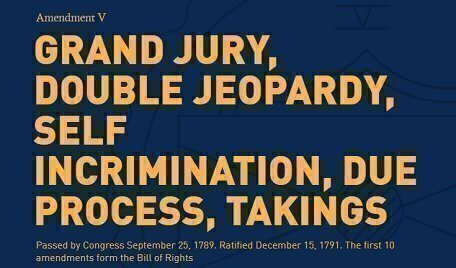What are the basic underpinnings of a federal grand jury? In the excerpt from the National Constitution Center’s Interactive Constitution, Paul Cassell and Kate Stith look at their origin as related to the Fifth Amendment.
 The first part of the Fifth Amendment reads as follows: “No person shall be held to answer for a capital, or otherwise infamous crime, unless on a presentment or indictment of a Grand Jury, except in cases arising in the land or naval forces, or in the Militia, when in actual service in time of War or public danger …”
The first part of the Fifth Amendment reads as follows: “No person shall be held to answer for a capital, or otherwise infamous crime, unless on a presentment or indictment of a Grand Jury, except in cases arising in the land or naval forces, or in the Militia, when in actual service in time of War or public danger …”
Cassell, a University of Utah law professor, and Stith, from the Yale Law School, explained the presence of Grand Juries in the Constitution, in a common interpretation of the Fifth Amendment:
The first of the criminal procedure clauses requires that felony offenses in federal court be charged by grand jury indictment. (A grand jury is a panel of citizens that hears evidence that the prosecutor has against the accused, and decides if an “indictment,” or formal criminal charges, should be filed against them.)
This is one of only a few provisions of the Bill of Rights that the Supreme Court has not held to apply to the states through the Due Process Clause of the Fourteenth Amendment (the others being the Third Amendment’s protection against quartering of soldiers, the Sixth Amendment’s requirement of trial in the district where the crime was committed, the Seventh Amendment’s requirement of jury trial in certain civil cases, and possibly the Eighth Amendment’s prohibition of excessive fines).
That the Court has been reluctant to apply the grand jury requirement to the states is unsurprising. While the origins of the grand jury are ancient—an ancestor of the modern grand jury was included in the Magna Carta—today, the United States is the only country in the world that uses grand juries. In addition to the federal government, about half the states provide for grand juries—though in many of these there exist other ways of filing formal charges, such as a prosecutorial information followed by an adversarial but a relatively informal “preliminary hearing” before a judge (to make sure there is at least “probable cause” for the charge, the same standard of proof that a grand jury is told to apply). As early as 1884, the Supreme Court held that the grand jury is not a fundamental requirement of due process, and Justice Holmes’ lone dissent from that judgment has been joined by only one Justice (Douglas) in the intervening years.
Recent scholarship has upset the previous understanding that the grand jury was from its inception venerated because it was not only a “sword” (accusing individuals of crimes) but also a “shield” (against oppressive or arbitrary authority). In its early incarnation in England, the grand jury was fundamentally an instrument of the crown, obliging unpaid citizens to help enforce the King’s law. Over the centuries, the idea of a citizen check on royal prerogative became more valued. By the time of the framing of our Constitution, both the “grand” jury (from the French for large, in size—today grand juries are often composed of 24 citizens), and the “petit” jury (from the French for small—today criminal trial juries may be composed of as few as six citizens) were understood, in both Britain and the colonies, to be important bulwarks of freedom from tyranny.
Few in the modern era would espouse such a view. The former Chief Judge of the New York Court of Appeals (that state’s highest court) famously remarked in recent years that because prosecutors —agents of the executive branch—control what information a grand jury hears, any grand jury today would, if requested, “indict a ham sandwich.” While this is a useful exaggeration—the Supreme Court has held that federal grand juries need not adhere to trial rules of evidence, or be told of evidence exculpating the defendant—few prosecutors, fortunately, are interested in indicting ham sandwiches! Rather, the greatest advantage grand juries now provide (at least in federal courts, which are not as overburdened as state courts) is allowing the prosecutor to use the grand jury as a pre-trial “focus group,” learning which evidence or witnesses are especially convincing, or unconvincing.
At least in federal court, grand juries are here to stay. The institution is written into the Fifth Amendment too clearly to be “interpreted” away. Moreover, neither pro-law enforcement forces (for obvious reasons) nor allies of those accused (because occasionally grand juries do refuse to indict—in the legal parlance, returning a “no true bill”) have reason to urge their abolition through amendment of the Constitution.
You can read more from Cassell and Stith on the Fifth Amendment, and matters of debate from different perspectives, at our Interactive Constitution at: https://constitutioncenter.org/the-constitution/amendments/amendment-v/clauses/632







